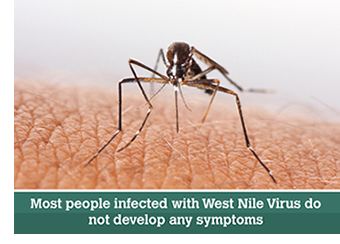WEST NILE VIRUS
West Nile Virus Protection Begins With Long-Term Mosquito Control
Each spring when the weather warms and people emerge from their winter hibernation, mosquitoes too become active. Once outdoor temperatures rise to 50 degrees Fahrenheit, mosquitoes begin to emerge from hibernation. This means as soon as you begin your outdoor activities, these pests are already out for blood.

Mosquitoes are more than a nuisance; they can carry disease! West Nile Virus is the most common disease spread by these pests, according to the Center for Disease Control and Prevention (CDC). Also, West Nile Virus is transmitted to pets and other domestic animals bitten by infected mosquitoes. West Nile Virus prevention begins with you learning more about this infectious disease, and how to effectively control mosquitoes around your home.

What is West Nile Virus?
Mosquitoes began transmitting West Nile Virus in the U.S. around 1999. The virus was first found in humans living in the New York area, but it has since spread across the entire United States. Mosquitoes contract the virus when they bite birds infected with the disease. Birds can become infected through mosquito bites as well. Some birds, like hawks, owls, and other scavengers, can contract the virus from eating other dead birds.
Most birds that contract the virus live, but some birds, like jays and crows, often die. There is no evidence that people can contract West Nile Virus from birds, but as a precautionary measure, never touch or dispose of dead birds without wearing gloves.
Mosquitoes transmit the virus when they feed on you. Female mosquitoes are the biters. They need a blood meal to help them produce their eggs. Mosquitoes have skin-piercing mouth parts that inject a tiny amount of saliva into your skin before drawing out blood. The saliva helps prevent clotting, so the mosquito can easily draw out your blood. This mixing of saliva and blood is what transfers West Nile Virus to humans.
Incubation Period for West Nile Virus

Once bitten by an infected mosquito, people can begin to show symptoms in as little as two days, but it can take up to 2 weeks, according to the CDC. Only about one out of every five people bitten by a West Nile mosquito actually show symptoms, like a fever, but it is important to know what symptoms to watch for. About one percent of people bitten develop a severe reaction that can lead to West Nile Fever, which has long-lasting symptoms:
- Weakness
- Depression
- Tremors
- Fatigue
- And other signs of brain damage
Common West Nile Virus Symptoms
West Nile Virus symptoms can vary from person to person, depending on an individual’s reaction to the virus. West Nile Virus is not contagious, but can spread from person to person in a few ways:
- Blood transfusion
- Mother to child during pregnancy and breastfeeding
- Organ transplants
Once you’ve been bitten by an infected mosquito, you become immune to the virus whether you develop symptoms or not, so you cannot get it again.
Most people have no symptoms, but the small percentage of people that do develop a minor infection from the virus can expect symptoms such as these:
- Fatigue
- Headache
- Body Aches
- Fever
- Back pain
- Vomiting
- Diarrhea
Occasionally, other symptoms may develop:
- Eye pain
- Rash
- Swollen lymph nodes
There are no specific medications or treatments for mild cases of the virus.
Who’s at a Greater Risk of Infection?
A person’s age, current health and other factors can play a role in how an individual reacts to the virus. It is important that you know what to watch for in children and the elderly who may have sustained a West Nile mosquito bite.
West Nile Virus symptoms in children are the same as West Nile Virus symptoms in adults, and pose no increased risk. Infected children most often develop a mild fever, a rash on their trunk, and mild flu-like symptoms.
The elderly or individuals with compromised immune systems are at a greater risk of developing West Nile Encephalitis, a potentially fatal inflammation of the brain.
You should watch your loved one’s closely for symptoms that indicate a more severe reaction, especially in the elderly:
- Severe headache
- Stiff neck
- High fever
- Confusion
- Tremors
- Convulsions
- Sudden muscle weakness
- Paralysis
Anyone experiencing these symptoms needs to seek medical attention. These are symptoms of West Nile Encephalitis. West Nile virus is not fatal to everyone who contracts it. Only a small percentage of people develop the more severe neurological conditions that can be fatal.
West Nile Diagnosis and Treatment
Your doctor can diagnose West Nile Virus and further complications in one of three ways:
- Drawing blood to test for a rise in the level of antibodies for the virus
- Testing brain activity using an EEG or MRI
- Taking spinal fluid (spinal tap) to check for an elevated white blood cell count
West Nile Virus treatments depend on the severity of the condition. Most people fully recover at home taking over-the-counter pain relievers, getting rest, and drinking plenty of fluids.
In more severe cases, such as encephalitis or meningitis, there is no cure, but hospitalization is required to provide supportive therapy, such as medications to prevent other infections, intravenous fluids, a ventilator to assist with breathing and sometimes immunoglobulin drugs.
Researchers are working to develop other therapies and a vaccine for humans, but at this time, there is no medication or West Nile vaccine for humans.

West Nile Virus in Animals
Mosquitoes can transmit West Nile Virus to dogs, cats, horses, and other domestic animals. You can protect your animals by understanding the West Nile symptoms in dogs, cats and horses. The symptoms are not the same in all animals. However, like humans, older animals and those with weakened immune systems are more susceptible to the virus and its possible complications.
Dogs
West Nile symptoms in dogs are often mistaken for the flu or a respiratory illness. Symptoms in dogs include:
- Skin rash
- Fever that lasts several days
- Weakness and pain in muscles
- Swollen lymph nodes
Symptoms can begin within a day after the dog is bitten, and may be more or less severe depending on your dog’s immune system and how he/she reacts to the virus. Dogs, like people, are also at risk for encephalitis, which can be fatal if left untreated.
Your vet can draw blood and conduct testing to determine if the dog has West Nile Virus and if there are any signs of encephalitis. Dogs usually fight off the virus in a few days, but if the dog is not recovering, he/she will need vet care, including intravenous fluids.
Cats
Cats can contract West Nile Virus from mosquito bites and from eating infected bird carcasses. Cats generally show only mild signs of the disease, such as lethargy and a mild fever, but the more severe symptoms are not common in felines. It’s not likely that you would notice any unusual behavior or signs of West Nile symptoms in cats.
Horses
A horse bitten by a West Nile mosquito can begin to show symptoms in 5 to 15 days. Like people and dogs, the symptoms can vary based on how the horse reacts to the virus.
Some of the most common West Nile Virus symptoms in horses include the following:
- Weak limbs
- Muscle twitching
- Poor coordination
- Stumbling
- Partial paralysis
- Fever (sometimes)
Most horses can fully recover with at-home care with supportive veterinarian care. In severe cases, horses require hospitalization. During a hospital stay, your horse may require intravenous fluids and treatments to control fever. Other treatments may include:
- Slinging to reduce bed sores
- Head and leg protection
- Fluid therapy
- Intravenous feeding
A West Nile Virus vaccine is available for horses, but it must be given before an infection occurs. This is something you should discuss with your vet before mosquito season begins. Vaccinations are something to consider because about 17 percent of horses that contract the virus have a relapse or other complications after recovery.

West Nile: Where Is It?
Most West Nile Virus infections are more common during the months of June through September. The only states that have not reported West Nile cases are Hawaii and Alaska. All other states have reported cases. A number of factors go into determining where seasonal outbreaks occur in states with West Nile:
- Number of birds in an area with the virus
- Weather conditions (warm, wet weather equals more mosquitoes)
- Human behavior
- Size of mosquito populations
Not all mosquitoes carry the virus. There are thousands of species of mosquitoes around the world, but only a small percentage of mosquitoes are known to be common carriers:
- Asian tiger mosquitoes, which are found mainly in the southeastern U.S.
- House mosquitoes, which are common in the central and eastern portions of the U.S.
- Southern house mosquitoes, which are common vectors of West Nile Virus in the southern U.S.
- White dotted mosquitoes, which are commonly found in the central and eastern U.S.
- Upland flood water mosquitoes, which are found all over the U.S.
No matter what type of West Nile mosquito lives in your backyard, the best way to prevent West Nile Virus is by not getting bit. This means you need an effective, long-term solution to greatly reduce the mosquito population in your area.
Researchers are working to develop other therapies and a vaccine for humans, but at this time, there is no medication or West Nile vaccine for humans.
Effective West Nile Prevention
What is the best West Nile prevention? Not getting bit by an infected mosquito! This includes your family and your domestic animals. With all the mosquito control methods out there, you need to decide which ones offer your family the best protection.
You can buy mosquito repellents, use citronella candles, and even mosquito-proof your home. Using a repellent that contains DEET has been shown effective for keeping mosquitoes away, but it is must be reapplied often to keep working.
You can and should take steps to mosquito-proof your home to prevent these pests from getting indoors and biting you while you sleep. To mosquito-proof your home, consider these steps:
- Install or repair the screens on your windows and doors.
- Remove all sources of standing, stagnate water from around your home (bird baths, old tires, dog’s watering bowl, wading pools and the like)
- Report dead birds to your state’s health department or wildlife agency: do not touch them!
- Use larvicides to kill mosquito larvae in ponds or fountains around your home.


